Ukrainians revive interest in culture
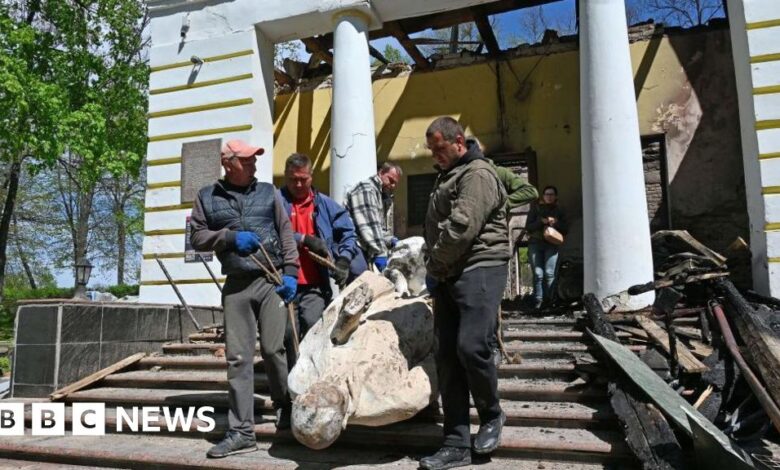
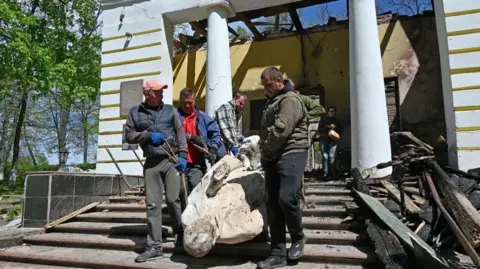 SERGEY BOBOK/AFP
SERGEY BOBOK/AFP Late on the night of May 7, 2022, a Russian missile struck a museum that was once home to the 18th-century Ukrainian poet and philosopher Hryhory Skovoroda.
“The roof was completely blown away, the walls were burnt and only the Skovoroda statue survived. It’s a miracle,” said Nastya Ishchenko, deputy director of the museum in the Kharkiv region of northeastern Ukraine.
It is one of 432 cultural heritage sites damaged in Ukraine since the full-scale invasion began on February 24, 2022, according to the United Nations cultural organization UNESCO.
The destruction of much of their culture not only pushed Ukrainians further away from the Russian-dominated cultural space they had shared for decades under Soviet rule.
It also awakened a thirst for their own culture, described by one daily newspaper as a “Ukrainian cultural explosion”.
In total, 139 religious sites, 214 buildings of historical or artistic value, 31 museums, 32 monuments, 15 libraries and one archive were attacked.
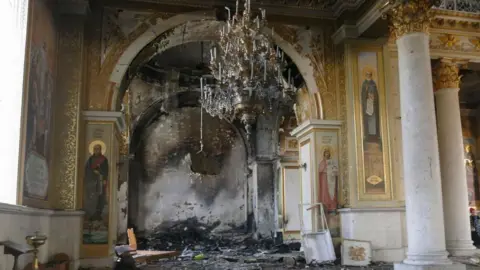 United States Environmental Protection Agency
United States Environmental Protection AgencyThe management of the Hryhoriy Skovoroda Museum knew that they could be attacked and most of the valuable artifacts were evacuated to a safer location.
There were no other potential targets near the museum, so Ukrainians believe it was bombed simply because of its cultural importance.
Ukrainian museums in Russian-occupied territories have faced a very different problem. The full scale of Russian military looting came to light in the final days of the occupation of the southern city of Kherson.
Entire trucks carrying works of art and historical artifacts were removed by the Russians – ostensibly for “safekeeping”.
The Kherson Art Museum said it had identified 120 works of art taken to Crimea – another occupied region of Ukraine. But the total number of artifacts the museum has lost is more than 10,000.
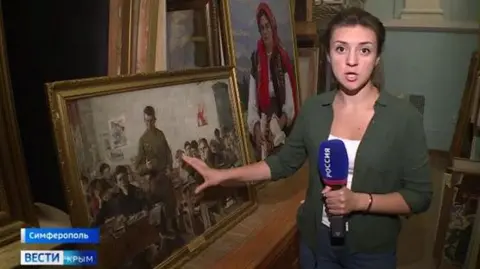 Russian state television
Russian state televisionIn some museums in occupied Ukraine, the Russians have removed artifacts for propaganda purposes. For example, an exhibition on modern Ukrainian history in Berdyansk was replaced with one praising the “special military operation” – the Kremlin’s official name for the war against Ukraine.
Last May, another aspect of modern Ukrainian culture came under attack when the Faktor Druk printing house in Kharkiv, used by most Ukrainian book publishers, was destroyed.
Not all cultural buildings are targeted, although the attack on Faktor Druk that killed seven people and destroyed 50,000 books is widely considered a targeted attack.
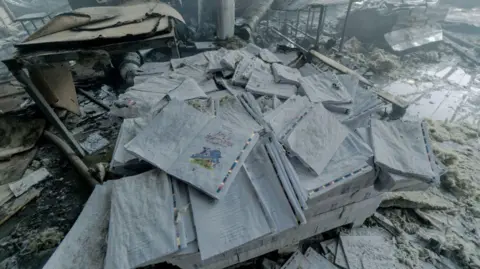 Getty Images
Getty ImagesSeveral other buildings were attacked because they were close to other buildings or made them unusable by Ukrainian officials or troops.
One publisher described the destruction of books at Faktor Druk as leading to a decline in morale in society. And the disappearance of many cultural sites in Ukraine has put a strain on the country’s social fabric.
They are vital for community cohesion and resilience in times of war, said the head of UNESCO’s office in Ukraine, Chiara Dezzi Bardeschi.
“What I see is that communities really need their culture and their cultural centres. They recognise how important it is to their community and they need it for their resilience. Culture is so important for healing trauma,” she told the BBC.
Ukraine’s acting culture minister, Rostyslav Karandeyev, believes that Russia is deliberately targeting the country’s spiritual and historical symbols: “Not only military targets and important infrastructure, but also any target that allows Ukrainians to talk about their own identity and state.”
As part of this policy, Russian forces have removed and destroyed Ukrainian books from schools and libraries in occupied areas, he told the BBC.
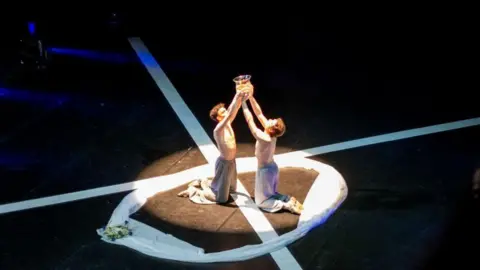 Les Kasyanov/Global Images
Les Kasyanov/Global ImagesBut amid that gloom, Nastya Ishchenko from the Skovoroda museum believes that Ukrainians are also starting to take more seriously what is at stake with Russia’s invasion.
“It’s like in a relationship: to understand what you’ve lost, you have to take away what you’ve lost,” she said. “We unite not around aggression or anger, but around the cultural values that each of us will pass on to future generations. It gives us a spark.”
The Den newspaper described the arrival of bands, performers and writers, with new plays premiering and packed theatres.
The large Ukrainian volunteer team provided not only necessities and clothing, necessary medicines, but also musical instruments.
“Children say music helps them emotionally, it takes them to a place where they don’t hear bombs or sirens. It helps them a lot,” British musician Irina Gould told the BBC’s Ukrainecast podcast.
“For them, it is the best medicine, helping them escape reality and live in a beautiful and happy world.”



